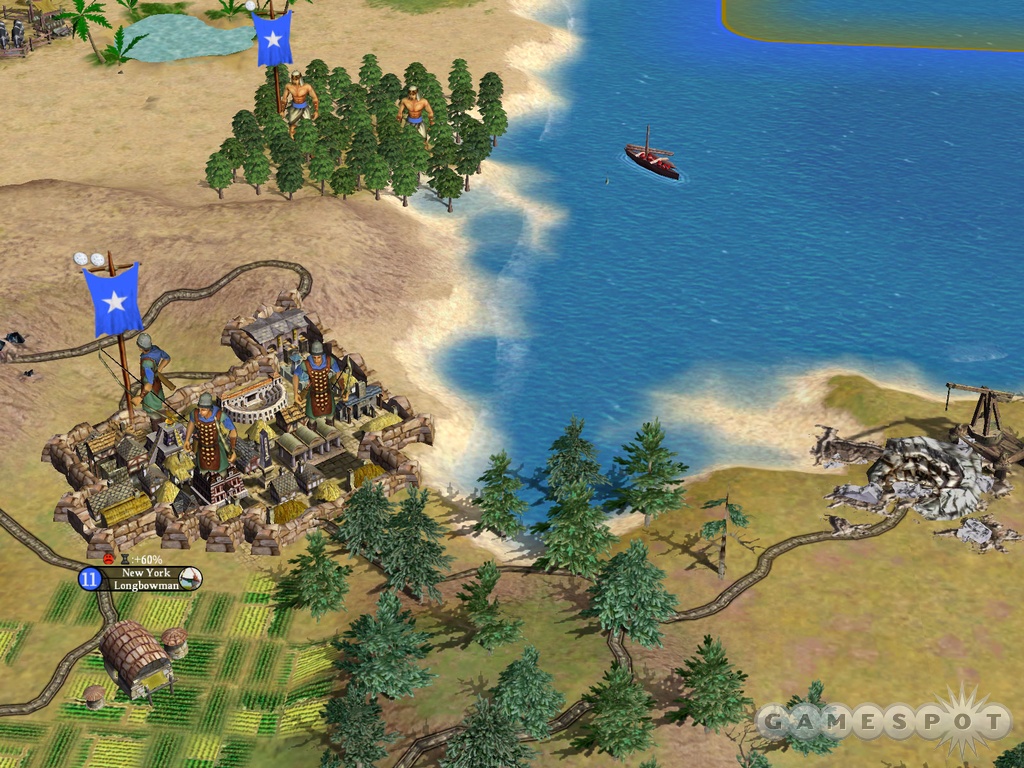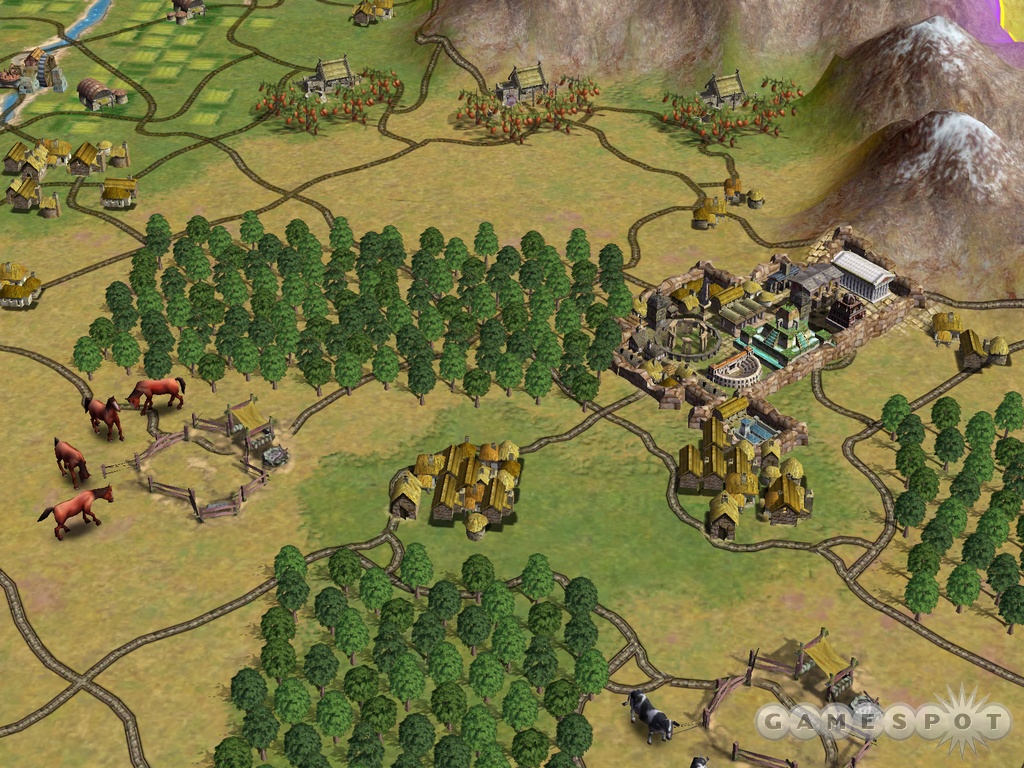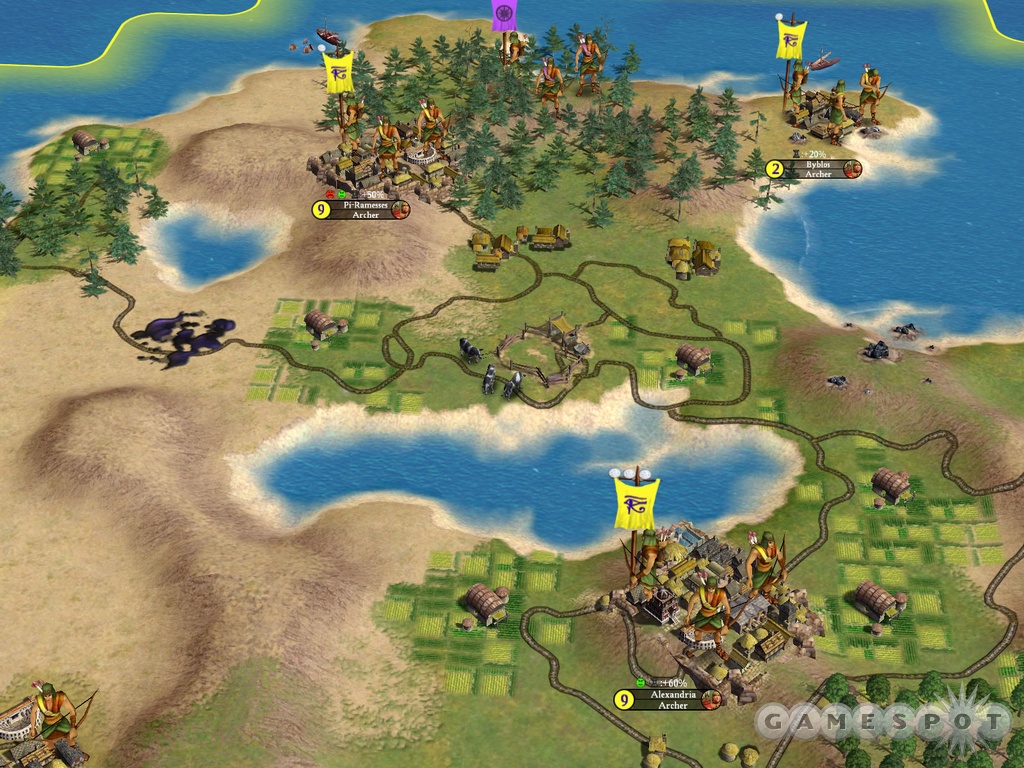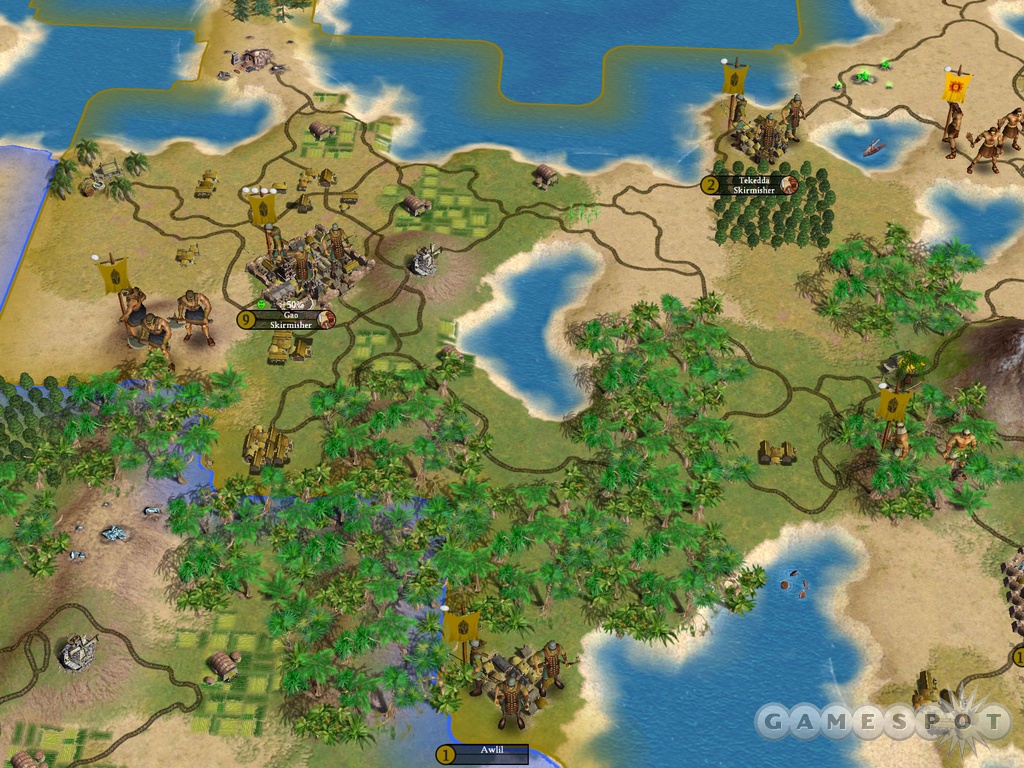Civilization IV Hands-On - Multiplayer
A multiplayer Civ game that works? That's what we thought, too, until we flew to Firaxis to actually play the game head-to-head.
Despite the hopes of many, the words "Civ" and "multiplayer" have never really clicked together. Ever since Civilization in 1991, fans have wanted to play against others in the great race to see who could guide their primitive civilization through history. That dream sort of became a reality with Civilization II: Multiplayer Gold in 1998. However, players quickly discovered that translating an epic, single-player, turn-based strategy game into a multiplayer affair wasn't as easy as hoped. Simply put, it took a very long time to play a multiplayer game. Meanwhile, things didn't get any better with 2001's Civilization III. First, multiplayer was stripped out of the core game to make sure it shipped on time. Then a broken version of multiplayer shipped with the Play the World expansion, and it didn't get fixed until the Conquests expansion a year later. So, yeah, you can probably see why multiplayer Civ remains an elusive dream to this day.

That is, until now. We recently flew to Firaxis' Maryland offices to participate in some multiplayer matches of Civilization IV, the upcoming chapter in the storied franchise. In the span of only a few hours, we played two multiplayer games of Civ, an impressive feat considering a single-player game of Civ can easily take upward of 10 hours or more. And, yes, both games were exciting and nail-biting affairs that came down to the finish to determine which side would win. How was this possible? Read on.
The first thing to keep in mind with Civ IV is that it represents a whole new chapter in the franchise in many ways. Not only does Civ IV rewrite many of the underlying rules of the series, but also it represents a new approach to creating a Civ game. Previous Civs were all designed as single-player games, with multiplayer modes uneasily tacked on to them, which was why they didn't work as multiplayer games. Determined to create a multiplayer Civ experience that not only worked but also was fun and fast to play, the designers went about creating the multiplayer game first for Civ IV. This let them not only get an early jump on play testing, but also it let them experiment and build new types of modes never before seen in a Civ game.
To make a multiplayer experience that works, Firaxis has taken several approaches. The traditional Stone Age-to-Space Age game now has an innovative, persistent server mode--called pit boss--that should let a group of players play the epic-length game at its leisure. However, we didn't get a chance to test out the pit boss or the epic-length game in multiplayer. We played one of the multiplayer modes which is specifically designed for fast-paced play--it was actually limited to 100 turns. And despite the fact that it limits you to the early eras of the game (basically the Stone Age to the Bronze Age), it's an amazingly effective mode. You know that you don't have a lot of time to waste, so the early-game emphasis is on expansion and conquest rather than defensive "turtling" for the long haul, which might occur in an epic-length contest.
We played in teams of two against each another, and this afforded us a chance to explore the new team dynamics. Basically, when you're teamed with another player, you get to share everything, from great wonder effects and resources, to research. For example, you share line-of-sight information with your teammate, so you can see what he or she sees. When you research a technology, you can choose to research the same technology together (thus cutting the research time in half), or you can have one person handle, say, all military technologies while you handle the economic technologies. And, of course, you can come to each other's aid during war. Unfortunately, we came to this realization too late in the first game, when we failed to expand our empire quickly enough and the opposing team threw wave after wave of units at us, isolating and whittling down our defenses. We did, however, learn some valuable lessons about combat.

In Civ IV, your best city defense unit early on isn't the spearmen unit, like it has been in every other Civ game to date, it's the archer unit. Spearmen are only really useful against cavalry in Civ IV. Meanwhile, warriors occupy the bottom-most rung of the military ladder, like they have in previous Civs. Warriors do have an important role, though, especially in the dangerous new world of Civ IV. That's because in addition to roving bands of barbarians, there's a new threat to keep in mind: wild animals. The Stone Age was a dangerous place for man, as wolves, lions, bears, and more roamed the land. The presence of these beasts in Civ IV means that sending out any unescorted settlers or workers can be a very dangerous proposition, especially since the animals seem to home in on easy prey. Thankfully, you can group a warrior with a worker or a settler, thus ensuring that the worker or settler is protected. The need to build escorts for each of your civilian units alone will drastically slow your rate of expansion, as you can't afford the risk of sending out droves of unprotected settlers and workers.
The Best Defense Is a Good...
You'll also definitely want to send out some warriors on their own to explore the land and to attack targets of opportunity, which is very important. Lead designer and programmer Soren Johnson explained that you get more experience for attacking, and less for defending, so it's worthwhile to send out warriors early on to have them attack packs of wild animals. That's because you can upgrade your military units in Civ IV when they gain experience levels. Basically, once a unit is promoted, you'll be alerted that you can upgrade it by selecting a bonus. You may upgrade its unit strength (making it tougher to kill), you may increase its city defense strength, you may improve its combat strength when fighting in woods or hills, and more. This way, you can create highly specialized units, such as elite city defenders. Or on the flip side, you can create elite city attackers. You'll also have a reason to want to preserve that unit for as long as possible. The wise leader is the one who manages to keep his or her elite units alive, as they're far more valuable than green units. 
The ultimate key to survival in Civ multiplayer, though, is expansion, which makes sense. If you have three cities, and your opponent has six cities, you're in obvious trouble. Simply put, you need to build up a larger empire than your rivals so you can generate a larger economy, which helps you not only create a larger army, but also lets you research up the technology tree faster, letting you unlock some potentially decisive technologies.
For example, during our second multiplayer game, we were also caught on the defensive early on, but we managed to hold on by building up archer units. It wasn't until the enemy researched new technologies and unlocked new units that we were finally overwhelmed. Yet on the flip side, it's far more difficult to expand your empire in Civ IV as quickly as you did in earlier Civ games. That's because the expansionism strategy of previous Civs, where you tried to build as many cities as possible as quickly as you could, has taken a hit in Civ IV. There are many more pressures on you at the beginning of the game, and it can be unwise, as well as downright difficult, to expand too rapidly. What you need to do is balance your priorities between expansion, research, building military units, and improving your core cities. Build too many cities too quickly and you'll have a lot of vulnerable cities to defend. But if you wait too long, the enemy will get the jump on you.
It's also important to read the terrain carefully. Mountains are no longer passable by land units, which should be taken into account. Key and secondary resources are scattered over the map, which could make building a city by them worth it, if for no other reason than to deny those same resources to the enemy. Defensible positions, such as rivers and hills, should be exploited, as they grant defensive bonuses to cities. Make sure workers construct roads so you can rapidly shift forces around your empire. Also, make sure to station units so you have line of sight in a defensive line, because one nasty tactic that we discovered is that human opponents can and will try to do an end around, sending military units to sneak around your borders, only to reappear at the gates of one of your vulnerable cities in the rear. Or instead they'll simply cut a road linking you to a critical resource, thus crippling your ability to construct advanced military units.

This is all common sense, of course, but it's proof that Civ IV works as a multiplayer game. You'll be caught up in the strategy of the game from the get-go, trying to work with your allies while desperately trying to outthink and outplay the opposition. Moreover, this short multiplayer game feels like an excellent mode for LAN games, for when you and your friends are hanging out together. There's a built-in, adjustable timer that ensures the game keeps moving forward--so you don't have to wait forever for someone to finish his or her turn.
Of course, we'll have to wait and see how the rest of Civ IV's multiplayer turns out. In particular, we'll have to wait and see what that ambitious pit boss mode will be like. But at this point, things are looking up for Civ multiplayer in a way it hasn't before. The short multiplayer can be ruthless and cutthroat, which is exactly what you want in a multiplayer strategy game. Civ IV's release date has moved forward a few weeks, so we can now expect the game to ship somewhere around the end of October or at the beginning of November.
Got a news tip or want to contact us directly? Email news@gamespot.com
Join the conversation